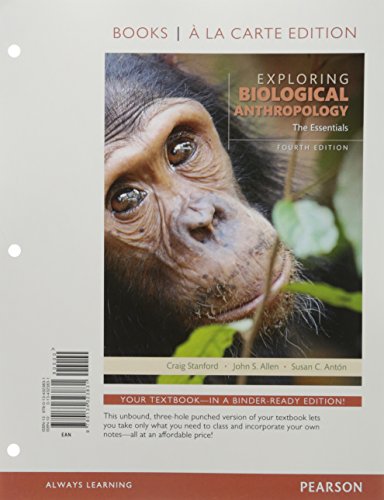
Synopsis
Discover the best of biological anthropology: From its earliest foundations to its most current innovations.
Over the past 40 years, the study of biological anthropology has rapidly evolved from focusing on just physical anthropology to including the study of the fossil record and the human skeleton, genetics of individuals and populations, our primate relatives, human adaptation, and human behavior.
The 3rd edition of Exploring Biological Anthropology combines the most up-to-date, comprehensive coverage of the foundations of the field with modern innovations and discoveries.
A better teaching and learning experience
This program will provide a better teaching and learning experience—for you and your students. Here’s how:
- Personalize Learning – The new MyAnthroLab delivers proven results in helping students succeed, provides engaging experiences that personalize learning, and comes from a trusted partner with educational expertise and a deep commitment to helping students and instructors achieve their goals.
- Improve Critical Thinking - This text provides students with the best possible art, photos, and mapsfor every topic covered in the book, helping them gain a better understanding of key material.
- Engage Students – “Insights and Advances” boxes and “Innovations” features help students develop an appreciation for the excitement of discovery.
- Support Instructors – MyAnthroLab, an author-reviewed Instructor’s Manual, Electronic “MyTest” Test Bank, PowerPoint Presentation Slides, and Pearson Custom course material are available. Additionally, we offer package options for the lab portion of your course with Method & Practice in Biological Anthropology: A Workbook and Laboratory Manual for Introductory Courses, orAtlas of Anthropology.
Note: MyAnthroLab does not come automatically packaged with this text. To purchase MyAnthroLab, please visit:www.myanthrolab.com.
"synopsis" may belong to another edition of this title.
About the Author
Craig Stanford is a professor of anthropology and biological sciences at the University of Southern California, where he also co-directs the Jane Goodall Research Center. He has conducted field research on primate behavior in south Asia, Latin America, and East Africa. He is well known for his long-term studies of meat-eating among wild chimpanzees in Gombe, Tanzania, and of the relationship between mountain gorillas and chimpanzees in the Impenetrable Forest of Uganda. He has authored or coauthored more than 130 scientific publications. Craig has received USC’s highest teaching awards for his introductory biological anthropology course. In addition, he has published fifteen books on primates, animal behavior and human origins, including Beautiful Minds (2008) and Planet Without Apes (2012). He and his wife, Erin Moore, a cultural anthropologist at USC, live in South Pasadena, California, and have three children.
John Allen is a research scientist in the Dornsife Cognitive Neuroscience Imaging Center and the Brain and Creativity Institute at the University of Southern California. He is also Research Associate in the Department of Anthropology, Indiana University. Previously, he was a neuroscience researcher at the University of Iowa College of Medicine and a faculty member in the Department of Anthropology at the University of Auckland, New Zealand, for several years. His primary research interests are the evolution of the human brain and behavior, and behavioral disease. He also has research experience in molecular genetics, nutritional anthropology, and the history of anthropology. He has conducted fieldwork in Japan, New Zealand, Papua New Guinea, and Palau. He has received university awards for teaching introductory courses in biological anthropology both as a graduate student instructor at the University of California and as a faculty member at the University of Auckland. In addition to Biological Anthropology, he is also the author of Medical Anthropology: A Biocultural Approach (with Andrea S. Wiley; second edition, 2013), The Lives of the Brain: Human Evolution and the Organ of Mind (2009), The Omnivorous Mind: Our Evolving Relationship with Food (2012), and Home: How Habitat Made Us Human (2015). John and his wife, Stephanie Sheffield, have two sons, Reid and Perry.
Susan Antón is a professor in the Center for the Study of Human Origins, Department of Anthropology at New York University, where she also directs the M.A. program in Human Skeletal Biology. Her field research concerns the evolution of genus Homo in Indonesia and human impact on island ecosystems in the South Pacific. She is best known for her research on H. erectus in Kenya and Indonesia, for which she was elected as a fellow of the American Association for the Advancement of Science (AAAS). She is the President of the American Association of Physical Anthropologists and past editor of the Journal of Human Evolution. She received awards for teaching as a graduate student instructor of introductory physical anthropology and anatomy at the University of California, was Teacher of the Year while at the University of Florida, and received a Golden Dozen teaching award and the Distinguished Teaching Medal from NYU. She has been twice elected to Who’s Who Among America’s Teachers. Susan and her husband, Carl Swisher, a geochronologist, raise Anatolian shepherd dogs.
"About this title" may belong to another edition of this title.

